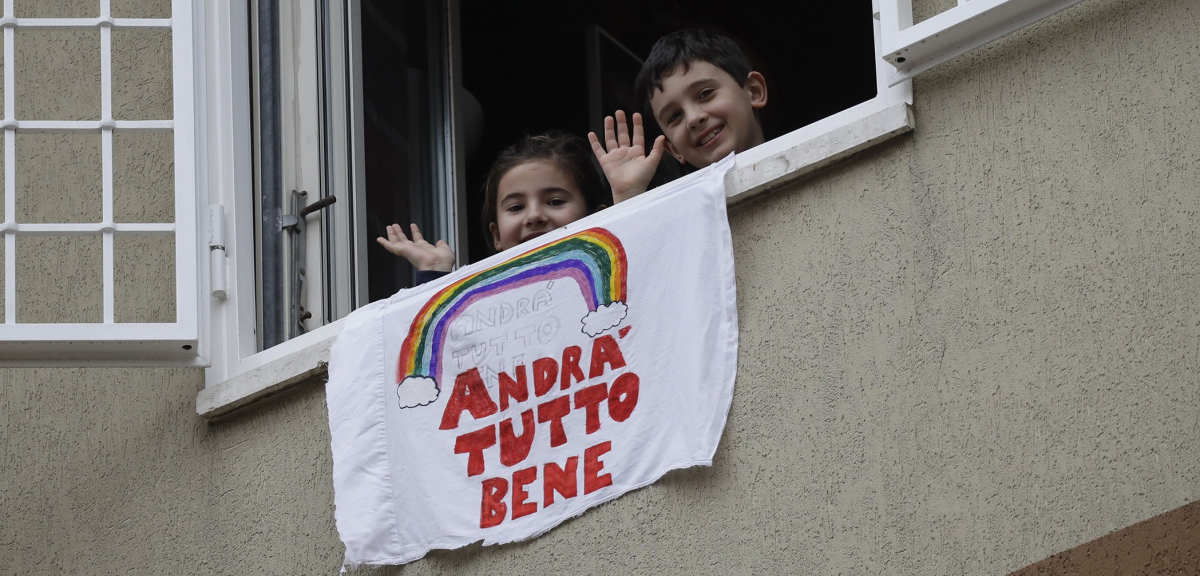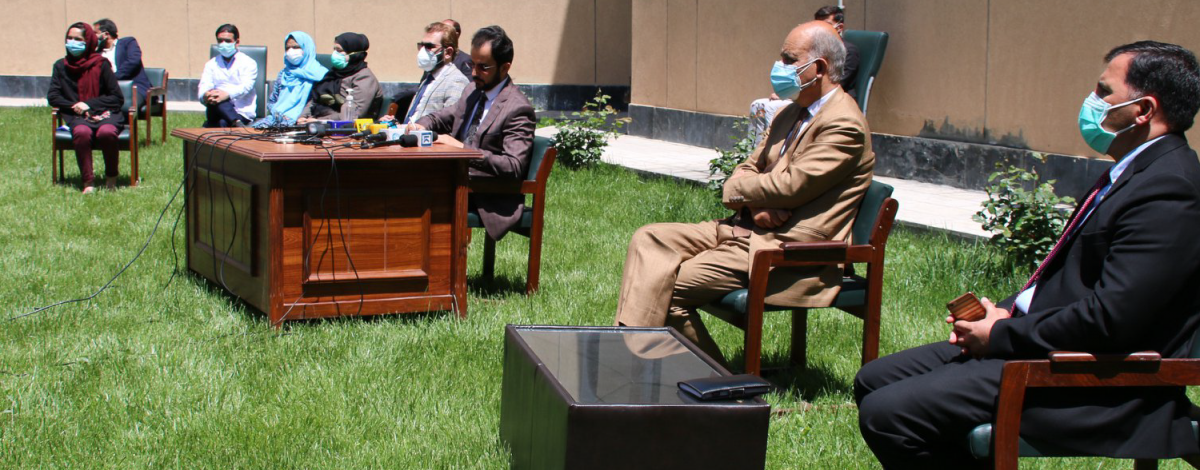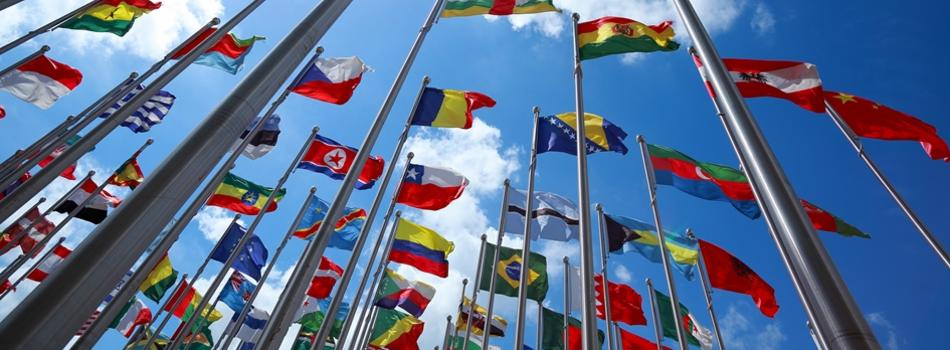Dear friends,
I feel privileged to have been entrusted with leading the International Development Law Organization (IDLO) at a time when its mission to promote a culture of justice and the rule of law to advance peace and sustainable development is more crucial than ever. Since I began my tenure as Director-General in January, our way of life has been transformed by the most severe disruption the world has faced in recent memory.
I am concerned, as we all are, by the global impact of the crisis, particularly on poor, marginalised and vulnerable populations. We have seen the pandemic expose the frailties and inequalities of our societies on multiple levels in every country where IDLO is present. We are working to support our partners to tackle their most pressing justice needs and address some of the underlying causes of exclusion, inequality and injustice.
We have adapted our ways of working and are actively contributing to the emergency response and recovery efforts.
 |
IDLO's contribution to the global response to COVID-19
As an intergovernmental organisation dedicated to promoting the rule of law and access to justice in every region of the world, IDLO firmly believes that good governance and the rule of law are central to managing the COVID-19 crisis and promoting resilience against future shocks.
In March in a policy statement: A Rule of Law Based Response to COVID-19, I outlined the rule of law’s essential contribution to mitigating and responding to the pandemic and to building just, equitable and sustainable societies in its aftermath.
On the International Day of Multilateralism and Diplomacy for Peace, I emphasised the importance of preserving multilateralism and rule of law as critical to peace and security, especially in the context of the present crisis which has placed an enormous strain on existing systems to prevent and resolve conflict. A renewed spirit of multilateralism, international solidarity and cooperation will be crucial if we are to successfully meet this unprecedented global challenge.
As indicated in these statements, IDLO’s efforts are focused on three related areas, drawing on our comparative advantage and mandate:
- strengthening legal and policy frameworks for managing the COVID-19 emergency and its aftermath;
- mitigating the impact of the crisis on justice systems and justice seekers; and
- advocating for the critical need for continued support and investment in justice and the rule of law.
 |
Strengthening legal and policy frameworks for managing the COVID-19 emergency and its aftermath
A key indicator of the effectiveness of laws and institutions is their capacity during times of crisis, in ensuring that the extraordinary measures put in place to manage and mitigate the impact of COVID-19 are fair and accessible to the most vulnerable members of society who most need the protection of the law.
IDLO is providing policy advice and implementation support to governments to establish enabling legal frameworks in strategic areas such as managing infectious diseases and promoting food security.
Public health laws and regulations rooted in the rule of law enable governments to enact emergency measures that protect people from infection and disease, while respecting their human rights.
In consultation with partners, including the World Health Organisation, we are exploring ways to support countries in strengthening national legal and policy frameworks on preparedness and responses to public health emergencies, such as the current pandemic. As I recently underlined on World Health Day, the rule of law can contribute to the COVID-19 response by enabling access to critical health services, including prevention and care for the poor and vulnerable.
We are also strengthening collaboration with the Food and Agriculture Organization, including in support of the COVID-19 Food Coalition launched by Italy. Our interventions aim to contribute to the development of strong legal and regulatory frameworks that ensure food supply and security during emergencies.
IDLO views protecting the planet and the environment as an act of justice. Strong laws supporting empowered people can help make the difference in moving towards a greener and more bio-diverse planet after the crisis.
As I reaffirmed this Earth Day, we are committed to helping our partners shift towards a more sustainable development model which meets the needs of the present while protecting the environment and the rights of future generations.
 |
Mitigating the impact of the crisis on justice systems and justice seekers
As with other parts of public life, the administration of justice and access to legal remedies and dispute resolution have been severely disrupted by the COVID-19 pandemic.
There are, however, many examples of innovative solutions to preserve continued access to justice, including open-air hearings with social distancing, proceedings through telephone or video conferencing services, and the use of alternative dispute resolution mechanisms.
For instance, in the Philippines, a former alumna of IDLO, Judge Rowena Tan, a presiding judge at a Regional Trial Court in Manila, is using innovative online initiatives to allow her Court to stay open during the pandemic. Judge Tan is one of the tens of thousands of legal professionals across the globe who have benefitted from capacity building training provided by IDLO for over 30 years.
Despite such efforts, the capacities of legal systems in all countries have been stretched, with courts in some places slowing their ability to process cases or even shutting down.
IDLO is working to ensure that effective justice systems are available to protect the rights of the most vulnerable members of society at a time when the ability to access services and the fair distribution of public resources can make a difference between life and death.
For example, in Kenya we have been assisting the judiciary to address its case backlog by automating case filing and management processes. Recently amended business legislation, developed with IDLO support, allows for the e-signature of court decisions. We also supported the development of e-filing procedures for commercial cases in the High Courts and are now exploring the possibility of expanding and replicating these efforts across the judiciary to fully automate the handling of cases.
In Kyrgyzstan we have supported a wide range of e-justice initiatives to improve the efficiency, transparency and accountability of the judiciary through digital technologies. and are assisting the development of e-trials for the Constitutional Court.
To support justice seekers in Afghanistan, IDLO is working with legal aid providers to ensure continued legal services to vulnerable communities, including women and children. Together with several civil society organisations and the Ministry of Women’s Affairs, IDLO is supporting women’s shelters that are now facing new challenges posed by the pandemic, including overcrowding and lack of Personal Protective Equipment .
In Jordan we have reoriented our work to assist civil society and women entrepreneurs as they deal with the impact of COVID-19 and prepare for economic recovery. A number of online consultations and working group sessions have been held with women entrepreneurs and legal experts to discuss issues such as taxation, social security and labour laws in the context of the pandemic.
As we all are aware, restrictions on movement have contributed to an alarming escalation in domestic violence around the world. We are adapting our work on combatting sexual and gender-based violence to meet the increased demand for support and services.
In Mongolia we are supporting interventions that facilitate access to information and provide support for women affected by domestic violence through webchats and hotlines and are working with local partners to obtain personal protective equipment which allows them to continue delivering vital services.
In Tunisia we are developing a ‘virtual legal aid’ mechanism to supplement an already existing domestic violence hotline. A series of online consultations has been launched with the Ministries of Justice, Interior and Social Affairs, and Women’s Affairs to ascertain the needs and priorities in tackling violence against women and girls in the context of the pandemic.
We are also actively consulting with our partners around the world to identify their key justice needs during the emergency with a view to developing nationally owned, context-specific programmes to address the most urgent priorities and protect those most at risk.
 |
Advocating for continued support and investment in justice and the rule of law
IDLO believes that the 2030 Agenda for Sustainable Development – particularly SDG 16 as an enabler of peace, justice and inclusion – is central to both managing the current crisis and promoting a just, equitable and sustainable recovery.
COVID-19’s heavy toll on the global economy is likely to be reflected in overseas development assistance and public sector budgets over the coming years. We are concerned that the impact of this contraction will be felt most severely by those who already live under conditions of extreme injustice and inequality.
The pandemic has resulted in the first regression in human development since 1990 and threatens countries’ abilities to sustain and advance progress on SDG 16 and the 2030 Agenda as a whole.
IDLO is intensifying its advocacy for the continued relevance of the rule of law and SDG 16, through mobilising multi-stakeholder coalitions to promote justice, producing research and knowledge products, and advancing policy solutions based on the rule of law.
 On 1 July IDLO is launching a Crisis Governance Forum, a series of online dialogues to share insights and good practices among policymakers and other stakeholders involved in COVID-19 crisis management. The initiative will highlight the critical importance of the 2030 Agenda and SDG 16 in designing post-pandemic social and economic recovery strategies and building resilience to similar external shocks in the future.
On 1 July IDLO is launching a Crisis Governance Forum, a series of online dialogues to share insights and good practices among policymakers and other stakeholders involved in COVID-19 crisis management. The initiative will highlight the critical importance of the 2030 Agenda and SDG 16 in designing post-pandemic social and economic recovery strategies and building resilience to similar external shocks in the future.
IDLO recently released a report on Justice for Women Amidst COVID-19 in partnership with UN Women, UNDP, UNODC, the World Bank, Pathfinders and The Elders. It provides a rapid assessment of major challenges to women’s access to justice in light of the COVID-19 pandemic and provides recommendations to mitigate the disproportionate impact of the crisis on women and girls.
We will also continue to advocate for the need for sustained investment in the rule of law and access to justice at local, national and international levels.
Looking ahead
The current crisis is reshaping our world in ways both large and small and its impact will be felt for a long time to come. In this context, we are currently developing a new Strategic Plan for IDLO (2021-2024) through a broad consultative process. The exercise is an opportunity to reflect on IDLO’s place in the rapidly evolving global environment and to formulate a Strategy that is forward looking and responsive to the needs of justice seekers.
![]() Our new Strategic Plan will be based on the understanding that societies that are more just, peaceful and inclusive are also more resilient and better able to recover in the face of crises like the current pandemic.
Our new Strategic Plan will be based on the understanding that societies that are more just, peaceful and inclusive are also more resilient and better able to recover in the face of crises like the current pandemic.
The principles of equality and non-discrimination, and the focus on good governance and effective institutions that form the core of SDG 16 and cut across the entire 2030 Agenda, must guide our efforts to mitigate the crisis and build back better.
To do so, we must strengthen laws and institutions that enable governments to act while treating people fairly and respecting their rights. We must close the fault lines of exclusion, insecurity and injustice that have opened across our societies, holding back their development potential and leaving them more vulnerable to instability and conflict. We must protect the interests of the marginalised and vulnerable, and ensure they have an equal chance to contribute to society and live a life of dignity.
In this sense, progress towards the rule of law, towards SDG 16 and the 2030 Agenda, is not simply an aspiration, it is rather a concrete and tangible way of inoculating our societies against a disruptive and unpredictable future.
I look forward to working with you to realise our shared ambitions to build a more peaceful, just and inclusive world.
Best wishes,
Jan Beagle
Director-General
Photos from top to bottom: © AP_Alessandra Tarantino, © Ministry of Public Health of Afghanistan, © Judiciary of Kenya


